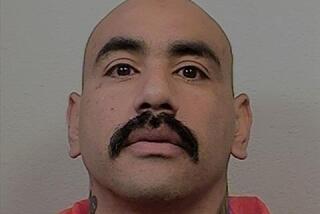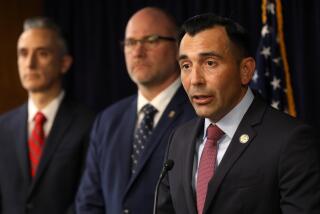Apparent suicide ends 27-year saga
- Share via
Bringing a dramatic conclusion to a nearly three-decade-long international crime saga, a Japanese businessman accused of conspiring to have his wife murdered 27 years ago in Los Angeles hanged himself in his jail cell hours after returning to face charges, police said Saturday.
Kazuyoshi Miura, 61, was found dead in his jail cell at the Los Angeles Police Department’s Parker Center headquarters about 9:45 p.m. Friday by an officer during a routine inspection, said Deputy Chief Charlie Beck.
“It was apparent that the murder suspect, alone in his cell, had used a piece of his shirt as a makeshift ligature around his neck,” Beck said.
Miura, who had been dressed in street clothes, was taken to County-USC Medical Center, where he was pronounced dead, Beck said.
Authorities contacted the Japanese consulate general’s office, which notified Miura’s family in Japan.
Miura’s case has long been a high-profile story in Japan, where the once ocean-hopping importer was dubbed “the Japanese O.J. Simpson.”
His extradition had drawn journalists to Los Angeles from dozens of media outlets as far away as Bangkok, Tokyo and Saipan, the U.S. territory Miura had been visiting when he was taken into custody in February.
Miura’s attorney, Mark Geragos, who spoke from New York, said the Los Angeles County district attorney’s office notified him about 12:15 a.m. Saturday. “None of this makes any sense,” he said.
Geragos said a lawyer from his office had visited Miura, who was in good spirits. “There was no indication that he was despondent or depressed,” Geragos said. “He was ready and girded for the fight.”
Geragos said he would demand an independent investigation. Beck said the department would conduct a “thorough investigation,” which will be reviewed by Police Chief William J. Bratton, the LAPD’s inspector general and the Los Angeles Police Commission.
“Irony of ironies that after all this time he’s finally back and now this,” Bratton said Saturday. “It’s tragic in the sense that the opportunity to have him go before a court, well, that opportunity is not going to present itself. Whatever his reason for taking his own life, well, it leaves the whole matter unsettled.”
According to the state’s “minimum jail standards,” cell inspections are required every 30 minutes. Based on the LAPD’s preliminary information, a detention officer checked on Miura at 9:36 p.m. and found nothing unusual.
The officer signed an inspection log on a clipboard outside the cell, Beck said. Less than 10 minutes later, another officer passed by and saw that Miura had hanged himself with his T-shirt, Beck said.
The officer and two others rushed into the cell to administer CPR. Medical personnel from the jail dispensary and Los Angeles Fire Department paramedics continued treating Miura.
Beck said Miura had made no statements indicating that he was suicidal, nor had he acted in any way to suggest that he would kill himself.
Miura had served stints in jails in Japan and Saipan without displaying any signs of extreme emotional problems, police said.
Miura was accused of plotting the death of his wife, Kazumi Miura, 28, who was shot in the head while the couple were visiting downtown Los Angeles in November 1981. Miura was shot in the leg.
A warrant for his arrest was issued in 1988 alleging murder and conspiracy, but Los Angeles detectives could not extradite him while he was living in Japan. Miura was convicted there of murder in 1994, but the verdict was later overturned.
But in February, Miura wrote on his blog about plans to visit Saipan. He was arrested there on the original 1988 arrest warrant as he tried to return to Japan.
Miura at first fought extradition but last month agreed to return to L.A. after a judge dismissed the murder charge as double jeopardy because of Miura’s trial in Japan. A charge of conspiracy to commit murder remained.
On Thursday, county prosecutors filed for reinstatement of the murder charge, citing a 2004 change in state law that removed double jeopardy protection for those tried overseas. A hearing had been set for later this week.
Escorted by police, Miura arrived shortly before 5 a.m. Friday at Los Angeles International Airport and was taken to police headquarters, where a throng of reporters greeted him.
He had been booked and was scheduled to be arraigned Tuesday on the conspiracy charge.
Japanese Consul Masaru Dekiba, besieged by Japanese media outside Parker Center on Saturday morning, said he was “astonished” that Miura had committed suicide.
Dekiba said he had spoken the previous morning with Miura, who seemed “very nice and healthy.”
In Japan, Miura’s death was the top story. The Mainichi newspaper even produced an extra edition to distribute on the streets.
Although Miura was not popular in Japan, the reports questioned how the LAPD could allow the suicide of such a major suspect. The Sankei newspaper, for instance, ran a blaring headline: “LAPD’s Huge Failure.”
“It seems to me that U.S. prosecutors pushed Miura to death,” Aoyama Gakuin law professor Osamu Niikura told the Mainichi newspaper. “He was so tired from his long trip from Saipan to L.A. . . . It was natural for him to be nervous and psychologically stressed out.”
Eizo Yamagiwa, director of a Miura support group, angrily blamed U.S. and Japanese officials for Miura’s death. “Miura was killed by the Japanese and U.S. governments,” he told Kyodo News Service. “The Japanese government failed to protect him.”
One LAPD detective involved in the case expressed regret that the case had ended in such a way.
Frank Garcia, the LAPD’s lead detective on the case in the mid-1980s, said he was shocked and chagrined by Miura’s death. But he said it had been well-known among U.S. and Japanese authorities that Miura feared returning to the United States.
“He never wanted to set foot in this country,” Garcia said. “He never wanted to return because of the jail system here. He was terrified of it. It’s not a nice place to be.”
Prosecutors believed Miura conspired to kill his wife, possibly by signaling someone else to shoot, and collect $750,000 in life insurance payments.
No one else has been charged in connection with the shooting.
Jackson said that even had prosecutors not prevailed in reinstating the murder charge, Miura could still have faced 25 years to life in state prison if convicted of conspiracy.
Jackson and the other detectives had been in Tokyo on Monday to meet with investigators and also accompanied Kazumi Miura’s mother on a visit to her daughter’s grave.
“That’s what moves us in these cases . . . ,” Jackson said. “We carry a torch for the victim. Kazumi Miura was a beautiful woman, and obviously her life ended way, way too soon.”
--
andrew.blankstein@latimes.com
teresa.watanabe@latimes.com
--
Times staff writers Richard Winton and Joel Rubin contributed to this report.
More to Read
Sign up for Essential California
The most important California stories and recommendations in your inbox every morning.
You may occasionally receive promotional content from the Los Angeles Times.















